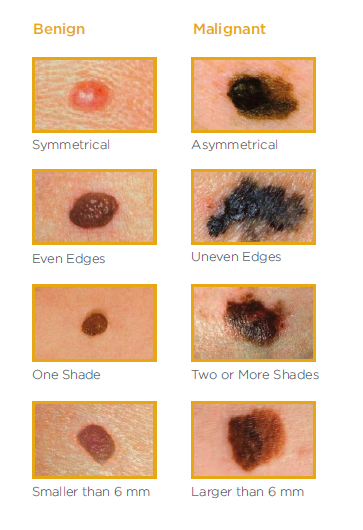Skin Cancer & Melanoma - Learn the ABCDE's of Skin Cancer

Skin cancer is the most common kind of cancer in the United States. In fact, it is estimated that one out of seven people in the United States are diagnosed with skin cancer each year.

What Causes Skin Cancer?
Certain risk factors put you at higher risk for developing skin cancer. Skin cancer risk factors may include excessive exposure to sun and tanning beds, a history of sunburn, fair skin, family history and certain medical conditions. Melanoma, a type of skin cancer, is a less common, but more serious type of skin cancer.
Who Can Develop Skin Cancer?
The people most likely to develop skin cancer are individuals with fair skin, blonde or red hair, light-colored eyes, a history of sun exposure or a tendency to burn or freckle when exposed to sun. Those who have a family history of skin cancer are also at increased risk. People of all colors can develop skin cancer.
Doing a self-check of your skin once a month at home can help you find changes in the way your skin looks or feels. Use a mirror to check for anything new on your skin, such as a new mole or changes to a mole you already have. Keep track of any changes you may find, and discuss these changes with your doctor.
The ABCDE’s of Skin Cancer
- > Asymmetry: One half of the spot or mole does not match the other half
- > Border: The edges are often irregular, uneven, or ragged; the pigment, or color, may spread into the surrounding skin
- > Color: The color is not even, and there may be more than one shade or color present; shades of black, brown, and tan may be present; areas of white, gray, red, pink, or blue may be seen
- > Diameter: The size of the spot or mole can be tiny but it usually is larger than the size of a pea (one fourth of an inch) or larger
- > Evolving: The size, shape, or color of the spot has changed over the past few weeks or months
If you have a lesion or skin change, have a diagnosis and need further treatment, or want a second opinion, outstanding skin cancer care is right here, close to home.
Speak with your doctor right away, if you notice any skin changes. To find a doctor near you, visit the Mountainside Medical Group or call us at 866-999-5162. Virtual visits are available.
Learn more about the skin cancer and melanoma at on the Melanoma & Skin Cancer Center web page.




